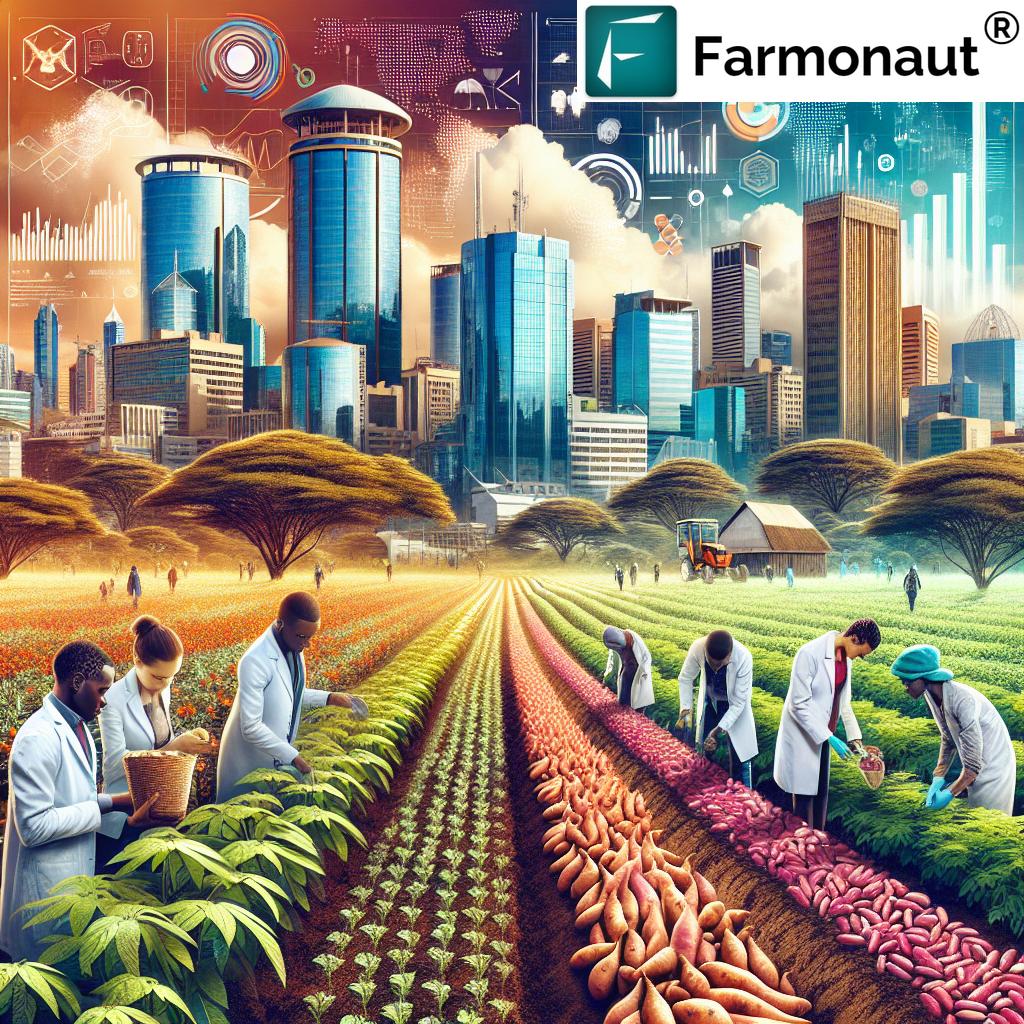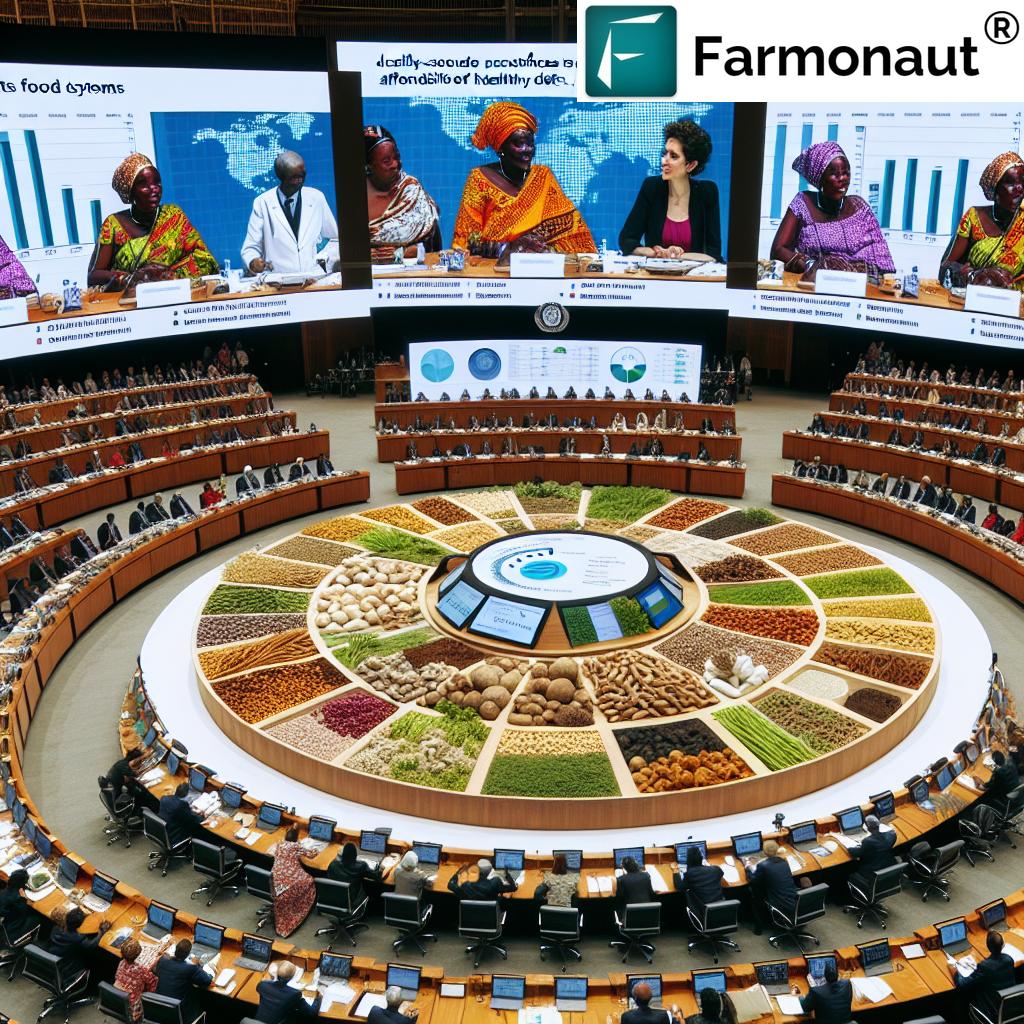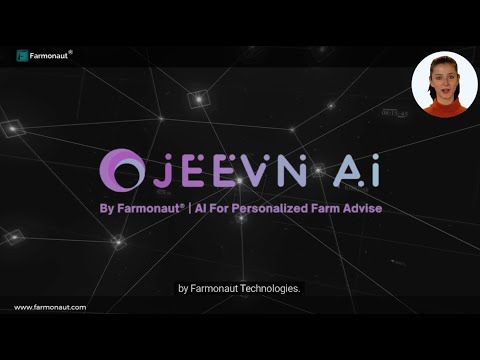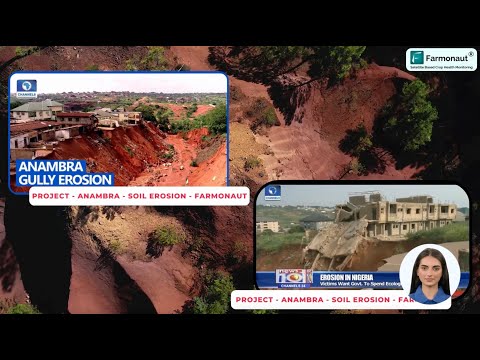Revolutionizing Nairobi’s Agriculture: Sustainable Solutions for Food Security in the Face of Climate Change
“The Nairobi conference on sustainable agriculture featured a menu showcasing locally sourced, biofortified crops from sustainable production techniques.”
“Scientists and policymakers from around the world gathered in Nairobi to address global food security challenges exacerbated by climate change.”
In the heart of Nairobi, a groundbreaking conference has set the stage for a revolution in agriculture, focusing on sustainable solutions and food systems innovation. As we face the mounting challenges of climate change and food security, scientists, policymakers, and innovators have come together to explore science-driven agricultural policies that address the global crisis. This event not only highlights the critical role of empowering women in agriculture but also emphasizes the importance of engaging youth to transform food production methods.
We at Farmonaut are excited to witness and contribute to this pivotal moment in agricultural history. Our satellite-based farm management solutions align perfectly with the conference’s focus on innovative, sustainable approaches to farming. As we delve into the discussions and outcomes of this event, we’ll explore how cutting-edge technologies and data-driven insights can revolutionize agriculture in Nairobi and beyond.
The Chef’s Manifesto: A Taste of Sustainability
The conference kicked off with a culinary experience that perfectly encapsulated its mission. Nairobi Chef Kiran Jethwa, as part of The Chef’s Manifesto project, prepared a menu that was not just a feast for the taste buds but also a testament to sustainable food production. This project, which unites over 1,500 chefs worldwide, explores ways to ensure that the food they prepare is both planet-friendly and sustainable.

The menu featured an array of locally sourced, biofortified crops, showcasing the potential of sustainable food production techniques:
- High Iron Red Kidney Bean and Biofortified Sweet Potato
- Swahili Curry with Toasted Ginger and Dhania
- Tilapia Pilau with Omena (Native Small Fish)
- Slow Braised Kenyan Kinyeji Chicken Stew with Cassava
- Arrow Root with Seared Terere (Amaranth and Millet)
- Jaegerry Halwa with Raisins and Roasted Cashews
This menu not only delighted the delegates’ palates but also served as a powerful demonstration of how local, nutritious ingredients can be incorporated into delicious meals. It’s a practical example of how we can promote healthy diets while supporting local farmers and sustainable agricultural practices.
The Crisis at Hand: Climate Change and Food Security
As delegates savored these sustainable dishes, the gravity of the global food crisis loomed large. Prof. Lindiwe Majele Sibanda, who chaired the Council of the Wise session in the opening plenary, set the tone for the conference by highlighting the multifaceted crisis we face:
“We’re in a crisis because of climate change. We’re in a crisis because of environmental and health degradation… We are in crisis because of gender inequality, no jobs for our youth, and nutrition insecurity.”
This stark reality underscores the urgent need for innovative solutions in agriculture. At Farmonaut, we recognize these challenges and offer tools like our carbon footprinting feature, which helps agribusinesses monitor and reduce their environmental impact. By providing real-time data on emissions, we enable farmers and agricultural companies to take concrete steps towards sustainability and compliance with environmental regulations.
The Role of Science in Agriculture
A key theme that emerged from the conference was the critical role of science in addressing agricultural challenges. Dr. Ibrahim Assane Mayaki, AU Special Envoy for Food Systems, emphasized the need for more leaders who are scientists, as “scientists solve problems.” This perspective aligns perfectly with our mission at Farmonaut, where we leverage advanced technologies like satellite imagery and artificial intelligence to provide data-driven solutions for farmers.
Our Jeevn AI Advisory System is a prime example of how science and technology can revolutionize farming practices. This AI-driven tool delivers real-time insights, weather forecasts, and expert crop management strategies, helping farmers make informed decisions that improve productivity and efficiency.
Empowering Women in Agriculture
Dr. Ameenah Firdaus Gurib-Fakim, former President of Mauritius, raised a crucial question about the empowerment of women in agriculture. She pointed out that food is predominantly produced by women, yet their role is often undervalued and unsupported. This observation highlights the need for inclusive agricultural policies and technologies that specifically address the needs and challenges faced by women farmers.
At Farmonaut, we recognize the vital role of women in agriculture and strive to make our technologies accessible and beneficial to all farmers, regardless of gender. Our user-friendly platform and mobile apps are designed to empower farmers with valuable insights, regardless of their technical background or resources.
Engaging Youth in Agriculture
Another critical aspect discussed at the conference was the engagement of youth in agriculture. Dr. Gurib-Fakim emphasized the need to change the narrative around agriculture, moving away from the stereotype of a woman with a hoe breaking hard earth. Instead, she stressed that agriculture is a trillion-dollar business, presenting immense opportunities for young entrepreneurs and innovators.
This perspective resonates strongly with our mission at Farmonaut. By integrating cutting-edge technologies like satellite imagery, AI, and blockchain into agriculture, we’re helping to transform the sector into an attractive, high-tech industry for young professionals. Our platform offers exciting opportunities for youth to engage in precision agriculture, data analysis, and sustainable farming practices.

Bold, Practical, and Inclusive Solutions
Mohamed Beavogui, former Prime Minister of the Republic of Guinea and expert in agricultural finance, called for “bold, practical, and inclusive solutions” to ensure that what is produced on the land ends up on the plate. This holistic approach to food systems aligns perfectly with Farmonaut’s comprehensive suite of tools for farm management.
Our blockchain-based traceability solution is an excellent example of such a bold and practical approach. By enabling transparency and security throughout the supply chain, we help ensure that food products can be traced from farm to consumer, enhancing trust and reducing fraud in the agricultural sector.
From Lab to Land to Plate: A Systems Approach
Prof. Sibanda summed up the conference’s approach with the phrase “LLP – from the lab to the land to the plate,” emphasizing the importance of a systems approach in reforming food, land, and water systems for global food security. This concept perfectly encapsulates the integrated approach we take at Farmonaut.
Our satellite-based crop health monitoring system, for instance, represents the journey from lab to land. By analyzing multispectral satellite images, we provide farmers with crucial insights into vegetation health, soil moisture levels, and other critical metrics. This data helps farmers make informed decisions about irrigation, fertilizer usage, and pest management, optimizing crop yields and reducing resource wastage.
The Importance of Contextualized, Evidence-Based Policymaking
A key takeaway from the conference was the need for policymaking to be “contextualized, evidence-based,” with consultation of those affected. This approach is crucial in ensuring that agricultural policies are effective and beneficial to farmers on the ground.
At Farmonaut, we support this approach by providing data-driven insights that can inform evidence-based policymaking. Our crop loan and insurance services, for example, use satellite-based verification to help financial institutions make informed decisions about agricultural loans and insurance. This not only reduces the risk of fraud but also improves access to financing for farmers, supporting more inclusive agricultural development.
Sustainable Agriculture Solutions vs. Traditional Methods
To better understand the impact of sustainable agriculture solutions discussed at the conference, let’s compare them with traditional farming methods:
| Agricultural Aspect | Traditional Methods | Sustainable Solutions | Environmental Impact |
|---|---|---|---|
| Crop Production | Monoculture, heavy use of synthetic fertilizers | Crop rotation, intercropping, use of biofortified crops | Low |
| Water Management | Flood irrigation | Drip irrigation, precision agriculture | Low |
| Soil Health | Intensive tilling, chemical fertilizers | No-till farming, organic fertilizers, cover crops | Low |
| Pest Control | Chemical pesticides | Integrated Pest Management (IPM) | Low |
| Climate Resilience | Limited adaptation strategies | Drought-resistant crops, agroforestry | Low |
This comparison clearly illustrates the benefits of sustainable agriculture solutions in terms of environmental impact and long-term sustainability. At Farmonaut, we’re committed to supporting these sustainable practices through our advanced farm management tools.
The Role of Technology in Sustainable Agriculture
The conference highlighted the crucial role of technology in driving sustainable agricultural practices. At Farmonaut, we’re at the forefront of this technological revolution in agriculture. Our platform integrates satellite imagery, AI, and blockchain to provide farmers with powerful tools for precision agriculture.
For instance, our fleet management solution helps agribusinesses optimize their logistics, reducing operational costs and improving overall efficiency. This not only benefits the bottom line but also contributes to reducing the carbon footprint of agricultural operations.
Addressing the Affordability of Healthy Diets
A sobering statistic shared at the conference revealed that 3.1 billion people worldwide cannot afford a healthy diet, according to the United Nations. This underscores the urgent need for innovative solutions that can make nutritious food more accessible and affordable.
At Farmonaut, we believe that by improving agricultural productivity and efficiency, we can contribute to making healthy food more affordable. Our tools help farmers optimize their resource use, potentially leading to higher yields and lower production costs. This, in turn, can help make nutritious food more accessible to a wider population.
The Future of Agriculture: Youth and Innovation
The conference emphasized that youth are the future of agriculture, and science should be at the forefront of agricultural practices. This aligns perfectly with our vision at Farmonaut. We’re committed to making precision agriculture accessible and appealing to young farmers and agri-entrepreneurs.
Our user-friendly platform and mobile apps are designed to appeal to tech-savvy youth, encouraging them to see agriculture as a modern, innovative sector. By providing advanced tools for large-scale farm management, we’re opening up new possibilities for young people to engage in agriculture at various scales and levels of complexity.
Conclusion: A Call to Action
The Nairobi conference on sustainable agriculture solutions has set a clear path forward for addressing the global food security crisis in the face of climate change. It has highlighted the crucial role of science, technology, and innovation in transforming our food systems.
At Farmonaut, we’re committed to being part of this solution. Our advanced farm management tools, powered by satellite technology and AI, are designed to support sustainable agriculture practices, empower farmers with data-driven insights, and contribute to more efficient and productive food systems.
As we move forward, let’s embrace these innovative solutions and work together towards a future where sustainable agriculture ensures food security for all, while preserving our planet for generations to come.
Farmonaut: Your Partner in Sustainable Agriculture
As we’ve seen throughout this discussion, the challenges facing agriculture today are complex and multifaceted. At Farmonaut, we’re dedicated to providing innovative solutions that address these challenges head-on. Our suite of tools is designed to support farmers, agribusinesses, and policymakers in their efforts to create more sustainable, efficient, and productive agricultural systems.
Whether you’re a small-scale farmer looking to optimize your crop yields, a large agribusiness aiming to improve your supply chain transparency, or a government agency working on food security policies, Farmonaut has the tools and expertise to support your goals.
We invite you to explore our platform and see how our satellite-based farm management solutions can revolutionize your approach to agriculture. Together, we can build a more sustainable and food-secure future.
Ready to transform your agricultural practices? Check out our solutions:
For developers interested in integrating our powerful satellite and weather data into their own systems, check out our API and API Developer Docs.
Earn With Farmonaut: Join our Affiliate Program
Earn 20% recurring commission with Farmonaut’s affiliate program by sharing your promo code and helping farmers save 10%. Onboard 10 Elite farmers monthly to earn a minimum of $148,000 annually—start now and grow your income!
FAQ
- What is precision agriculture?
Precision agriculture is a farming management concept that uses technology to observe, measure, and respond to variability in crops. It aims to optimize returns on inputs while preserving resources. - How does satellite imagery help in agriculture?
Satellite imagery provides valuable data on crop health, soil moisture, and other key metrics. This information helps farmers make informed decisions about irrigation, fertilization, and pest management. - What is biofortification?
Biofortification is the process of increasing the nutritional value of crops through conventional breeding methods or genetic modification. It’s a sustainable way to combat malnutrition. - How can blockchain technology be used in agriculture?
Blockchain can be used to create transparent and secure supply chains in agriculture. It allows for traceability of products from farm to consumer, reducing fraud and enhancing trust. - What role does AI play in sustainable agriculture?
AI can analyze large amounts of data to provide insights and predictions about crop health, weather patterns, and optimal resource use. This helps farmers make more informed decisions and improve efficiency.







